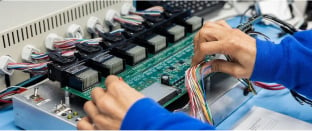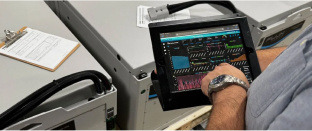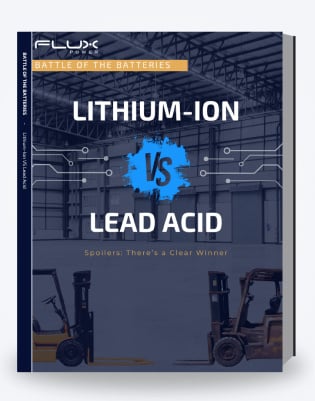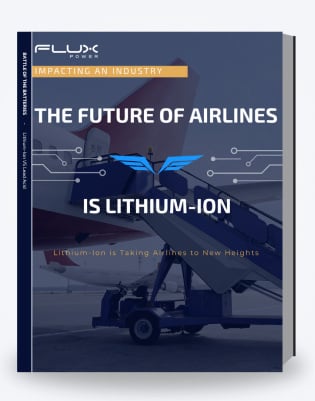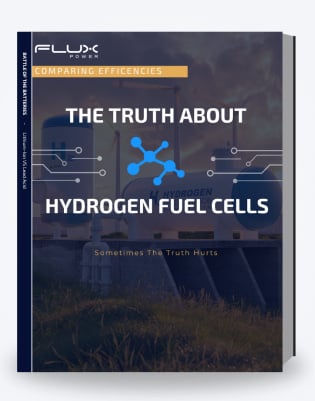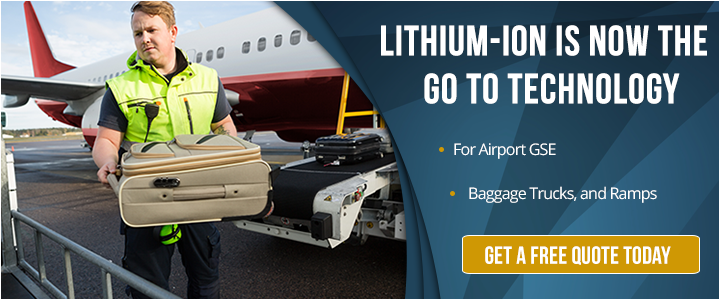Airport ground crews play a critical role in airline operations, especially as airline travel continues to be at an all-time high.
The International Air Transport Association is predicting air traffic will double in the next 20 years. With this significant growth, it’s no surprise that airports and airlines are looking for ways to reduce long-term costs and increase efficiency in their operations. (See the Future of Powering Airport Ground Equipment)
 The use of electric ground support equipment (GSE) has increased, revolutionizing ground operations by providing cleaner and more energy-efficient technology. Though once predominately powered by lead-acid batteries, ground support equipment is now more frequently relying on lithium-ion batteries as a power source.
The use of electric ground support equipment (GSE) has increased, revolutionizing ground operations by providing cleaner and more energy-efficient technology. Though once predominately powered by lead-acid batteries, ground support equipment is now more frequently relying on lithium-ion batteries as a power source.
Here are some of the reasons why lithium-ion batteries are powering this newest generation of electric GSE and why many consider it to be the best battery for GSE.
Fast Charge
At airports, there are few hours, if any at all, that do not require the use of ground support equipment. The aviation industry relies on equipment that consistently meets the needs of a fast-paced environment with little downtime.
Lithium-ion batteries have a remarkably fast charging time. Unlike lead-acid batteries, lithium-ion batteries can be fast-charged, such as during employee breaks or in between shifts.
Partial charges are safer and can prolong the life of a lithium-ion battery. A typical use cycle for ground support equipment at an airport that uses lithium-ion batteries may look like this:
- 2 hours of use
- 10 minutes to charge
- 2 hours of use
- 30 minutes to charge
- 2 hours of use
- 10 minutes to charge
In other words, lithium-ion batteries can be conveniently charged when workers take 10-minute breaks or 30-minute lunch breaks, allowing for continuous use throughout the day and across multiple shifts.
This is in stark contrast to a lead-acid battery, for example, that would require three different batteries to power a 24-hour shift. Each lead-acid battery would only provide 8 hours of use, followed by 8 hours of charging and 8 hours for a cool-down period. The convenient charging schedule of a lithium-ion battery allows ground crews to power equipment continuously throughout the day and even overnight.
Energy Efficiency
Lithium-ion batteries are hard to top when it comes to energy efficiency. Compared to lead-acid batteries, lithium-ion batteries hold and sustain more power.
Lead-acid batteries bleed energy. They lose amps when charging, discharging and even sitting idle. Once they start losing amps, ground support vehicles can become sluggish due to the voltage inside a lead-acid battery dropping at an increasing rate. That’s bad news for multi-shift operations, as well as for workers on a single shift since the efficiency of the battery suffers as the shift continues.
On the other hand, lithium-ion batteries maintain a constant voltage throughout the discharge cycle. That provides a much more efficient system, leading to as much as 50% energy savings when compared to a lead-acid battery. Lithium-ion batteries also store up to three times as much energy.
For an industry that can’t afford for its workers to slow down, lithium-ion batteries are a much better choice.
Environmental Benefits
Aircraft ground support equipment that are currently using lithium-ion batteries provide a more cost-effective and energy-efficient alternative. Today, many ground support vehicles are still run on diesel and gasoline. Unfortunately, diesel and gasoline are some of the worst offenders for carbon emissions and pollutants.
 Electric GSE powered by lithium-ion batteries offers more environmental benefits, including:
Electric GSE powered by lithium-ion batteries offers more environmental benefits, including:
- No toxic lead or acid spills
- No corrosion, sulfation or contamination
- No noxious fumes when charging
- Zero carbon emissions
Even among batteries used for electric vehicles, lithium-ion is one of the cleanest choices. Lead-acid batteries, for example, are susceptible to numerous other problems including corrosion. They also require a storage area with adequate ventilation to protect workers from dangerous gases during the required cool-down period.
For more environmental benefits of lithium-ion batteries, read our article, Reduce Costs and Emissions with Lithium Powered Airport GSE.
Cold Weather Performance
Most airports experience at least one cold season each year. Some are cold year-round. Using a battery that performs well in cold climates is a necessity for ground crew and safety equipment stationed at airports.
Lead-acid batteries require top-off procedures where distilled water is used for periodic maintenance when liquid electrolyte levels get too low. This can cause many problems where freezing temperatures regularly occur, whether seasonal or year-round.
Lithium-ion batteries also perform better at colder temperatures than other types of fast-charged used in electric ground equipment. A lead-acid battery’s capacity, for example, may reduce up to 50 percent during freezing temperatures.
On the other hand, a lithium-ion battery may lose less than 10 percent at the same temperature. All Flux Power GSE batteries also come with heaters that are efficiently controlled by the battery management system (BMS). The BMS maintains cell temperatures in their ideal range, even in cold weather applications.
Cost Savings
To further keep up with the demands of air travel, airports and airlines are constantly looking for advantages and incentives to reduce costs. More and more airlines are turning toward incorporating lithium-ion for its many financial benefits, including cost-savings features and opportunities for grants.
A few cost-savings benefits lithium-ion batteries provide include:
- Fewer batteries needed for multi-shift operations
- Maintenance-free and fewer replacement parts needed
- Up to 25% longer run times than lead-acid batteries
- High energy conversion efficiency
- Charging in-house rather than a separate, additional location
- No clean-up costs since acid spills, corrosion, sulfation or contamination do not occur
- Capable of integrating with GSE equipment, so no need to purchase new equipment
Individual airports are rolling out infrastructure that accommodates this eco-friendly option. In the United States, for example, the Federal Aviation Administration frequently awards grants to install electric charging points at airports. cool-down helps offset the costs associated with this infrastructure, sometimes by as much as 50 percent.
Bottom Line
Lithium-ion batteries are revolutionizing how electric ground support equipment is used at airports globally. Thanks to their energy-efficient and environmentally-friendly technology, lithium-ion batteries are increasingly becoming the top choice for supplying power to electric vehicles used in airport operations.

